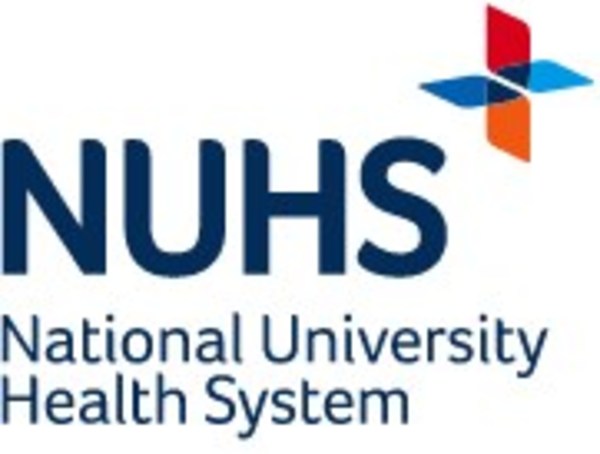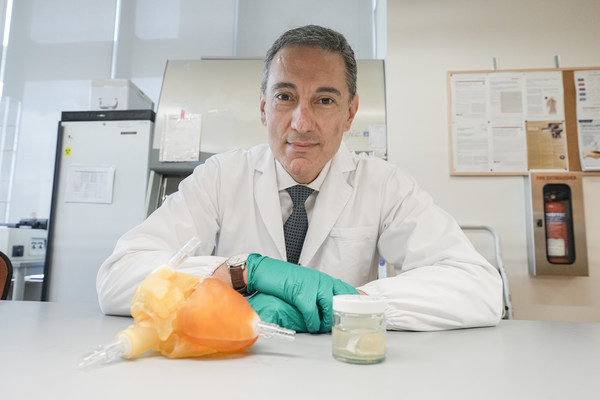First Naturally-designed and Personalised Bioprosthesis SingValve Set to Revolutionise Heart Valve Surgery

SINGAPORE,July 1,2021 -- A naturally-designed human-like personalised heart valve bioprosthesis developed by a team of clinician-scientists from the National University Health System (NUHS) looks set to be a game changer in the next generation of "personalised medicine" and further contributes to Singapore's growing MedTech ecosystem. As a personalised heart implant,based on pre-operative patient scans,the innovation has the potential to herald a new era of heart valve surgery.

Led by principal investigator,Associate Professor Theodoros Kofidis,Head and Senior Consultant,Department of Cardiac,Thoracic and Vascular Surgery,National University Heart Centre,Singapore (NUHCS),a team of clinician-scientists from the National University Health System (NUHS) developed a mitral valve bioprosthesis,named SingValve,that mimics the appearance,form and physical properties of a human mitral valve.
This newly-developed mitral valve bioprosthesis,mimics the appearance,form and physical properties of a human mitral valve. This innovation is led by Associate Professor Theodoros Kofidis,Singapore (NUHCS) and Associate Professor,Department of Surgery,Yong Loo Lin School of Medicine,National University of Singapore (NUS Medicine).
The research team led by principal investigator,A/Prof Kofidis,was awarded a translational grant of USD 3.6 million (SGD 4.9 million) from the National Research Foundation Singapore (NRF) Central Gap Fund in May this year. The grant will enable product verification,validation through in vitro and pre-clinical experiments,as well as comparative studies with existing valves. The first-in-human trials – which entail about 15 human implantations in two to three different countries – are expected to be conducted by 2023.
A/Prof Kofidis said: "In this advanced age of precision medicine and technology,we wanted to produce something closer to the natural anatomy and function of the mitral valve. SingValve was developed as a heart valve implant that is made for the individual patient. It belongs to the highest class of implants in regulatory terms,and constitutes a Class III[1] implant,which is the first of its kind globally,made in Singapore. SingValve creates a precedent in the local manufacturing of a high-value implant,which will further strengthen Singapore's MedTech scene."
SingValve – an unprecedented design
The mitral valve is situated in the left heart chamber and separates the left atrium from the left heart ventricle. It stops the flow of blood from the ventricle back to the atrium when the heart contracts. Patients suffering from severe mitral valve disease,including rheumatic heart diseases and advanced degenerative disease may need to have their mitral valve replaced when they are leaky,blocked and beyond repair[2]. There are around 500 patients in Singapore and over a million around the world requiring mitralvalve surgery annually.
Currently,there are two main types of artificial mitral valves – mechanical valves and tissue (bioprosthetic) valves which are unnatural,rigid,invariable and circular in shape,thereby impeding the movement of the left heart chamber and cannot be connected to the papillary muscles of the heart chamber. They comprise stents that protrude into the heart's cavities,which may result in foreign body reactions,blood clots,and infection.
Also,the existing artificial mitral valves come in only a few standard sizes,which may result in patient-prosthesis mismatch and aggravate the complications. Their long term outcomes are acceptable,but usually do not allow optimal function of the left ventricle and negatively impact the patient's life expectancy.
These limitations triggered A/Prof Kofidis to get down to some serious work four years ago – not only as a cardiac surgeon,but as a clinician-scientistwho is determined to translate his ideal mitral valve prosthesis into reality.
SingValve,which can be made from the patient's tissue or animal tissue,is designed to resemble the appearance,form and physical properties of a human mitral valve. The ring of the SingValve is highly flexible,allowing the heart to contract and dilate as it would have with a native mitral valve. This allows for less shear stress in the left heart chamber,and may potentially result in better heart recovery after the procedure.
Cardiac surgeons will be able to connect SingValve to the papillary muscles of the heart chamber through stitching,reducing the risk of foreign body reactions and infection. Furthermore,it can be personalised since it is produced based on the patient's pre-operative scans. This promises fewer complications and prolongs the durability of the prosthesis,reducing the potential risk of repeat surgery due to prosthesis wear and tear.
Under the Innovation to Startup (I2START) funding pathway,the team has received grants from the Singapore-MIT Alliance for Research and Technology Centre (SMART) and National Health Innovation Centre Singapore (NHIC) whereby a series of pre-clinical tests were carried out – the SingValve prototype and its variations were tested and modified to reach the best possible design and outcome. These studies,both acute and chronic,were carried out by A/Prof Kofidis's team at NUS Medicine as well as by independent surgeons at the prestigious preclinical testing facility Institut Mutualiste Montsouris Recherche (IMMR) in Paris,France,with very promising outcomes[3].
From lab to market
Mitral valve surgeries are projected to account for at least 62% of total mitral and aortic valve surgeries by 2025,up from 58% in 2018. In developing countries,the rate of increase reaches 15% per year. The opportunity for surgical mitral valve replacements is projected to be worth around USD 10 billion by 2025. The market potential of SingValve is therefore immense.
The establishment of a SingValve production outlet and logistic distribution hub in Singapore is expected to create jobs for the MedTech industry,boost research and development,and increase medical tourism to Singapore.
The development of SingValve was made possible through grants from NRF under its Clinician Scientist Individual Research Grant and administered by the Singapore Ministry of Health's National Medical Research Council,NHIC,SMART,and NUS Medicine. It has also gone through pre-submission by the Food and Drug Administration (FDA),as well as awarded a patent from the United States Patent and Trademark Office. The development of SingValve will be boosted with the USD3.6 million (SGD 4.9 million) grant from the NRF.
A/Prof Kofidis noted: "The support of our partners has been invaluable in the creation of SingValve,and it is our honour to be awarded the NRF grant to bring SingValve closer to market. We carry a profound sense of responsibility to make this 'invented and produced in Singapore' human implant a success not only in terms of improving the health outcomes of heart surgery patients undergoing mitral valve replacement,but also to be able to place Singapore on the world map of cardiovascular medicine and surgery."
"The SingValve is an important and meaningful technological innovation that paves the way for more medical technology innovations. Continuous research and innovation is critical to the translation of medtech to market,and NUS Medicine's clinician–scientists can successfully integrate their capabilities in research and innovation with the development of patient care solutions to address unmet healthcare needs. It is our aspiration that NUS Medicine will contribute to a thriving and vibrant medtech ecosystem in Singapore," said Professor Chong Yap Seng,Dean of the NUS Yong Loo Lin School of Medicine.
Professor Tan Huay Cheem,former Director and Senior Consultant Cardiologist,NUHCS commented: "The SingValve has the potential to become the 'perfect' valve for patients with heart valve disease because it fulfils the criteria of being customised to fit individual anatomies and functional characteristics,which improves safety and efficacy. Its advantage in allowing patients to not have to rely on rigid implants,offering superior haemodynamic performance,and potentially being more durable than the current mechanical and biological tissue valves respectively,fulfils the current unmet needs of valve prosthesis andis indeed a dream come true."
[1]These devices usually sustain or support life,are implanted,or present potential unreasonable risk of illness or injury. Examples of Class III devices include implantable pacemakers and breast implants. 10% of medical devices fall under this category.
[2]When that happened,high pressure builds up in the left atrium,which usually dilates,resulting in secondary side-effects such as high lung pressure and irregular heart rhythm.
[3]The SingValve underwent rigorous in vitro and pre-clinical testing and good echocardiographic results were achieved. Seamless integration with good haemodynamic results better than existing bioprosthetic valves were also observed.
For media enquiries,please contact:
Yuanyi LI
Communications Office
National University Health System
Email: yuanyi_li@nuhs.edu.sg
Binny TAY
Communications Office
National University Health System
Email: binny_tay@nuhs.edu.sg
About National University Heart Centre,Singapore
The National University Heart Centre,Singapore (NUHCS) brings together the resources,expertise and capabilities in the areas of Cardiology,Cardiothoracic and Vascular Surgery to better meet the needs of the growing number of patients with heart disease. A key centre for the treatment and management of complex cardiovascular diseases,its core clinical programmes include heart failure,structural heart disease,acute coronary syndrome,vascular medicine and therapy,women's heart health and heart rhythm.
Comprising a team of cardiovascular specialists and experts from a multitude of medical and surgical disciplines,the NUHCS provides a comprehensive and holistic approach to the treatment of patients with heart problems. This approach is backed by cutting edge knowledge and information gathered by the Cardiovascular Research Institute (CVRI).
The CVRI focuses on developing niche research work in creating new knowledge in support of NUHCS' core clinical programmes by working in close collaboration with both local and international renowned research institutes such as the Agency for Science,Technology and Research (A*STAR) and New Zealand's Christchurch School of Medicine and Health Sciences.
Partnerships are formed with various medical institutes as NUHCS is a selected training centre for international physicians. Education and training ensures that our medical professionals are kept abreast. Nurturing the next generation,our specialists are also actively involved in conducting workshops and teaching programmes for our medical undergraduates.
For more information,visit: https://www.nuhcs.com.sg.
About the National University Health System (NUHS)
The National University Health System (NUHS) aims to transform how illness is prevented and managed by discovering causes of disease,development of more effective treatments through collaborative multidisciplinary research and clinical trials,and creation of better technologies and care delivery systems in partnership with others who share the same values and vision.
Institutions in the NUHS Group include the National University Hospital,Ng Teng Fong General Hospital,Jurong Community Hospital and Alexandra Hospital; three National Specialty Centres - National University Cancer Institute,Singapore (NCIS),Singapore (NUHCS) and National University Centre for Oral Health,Singapore (NUCOHS); the National University Polyclinics (NUP); Jurong Medical Centre; and three NUS health sciences schools – NUS Yong Loo Lin School of Medicine (including the Alice Lee Centre for Nursing Studies),NUS Faculty of Dentistry and NUS Saw Swee Hock School of Public Health.
With member institutions under a common governance structure,NUHS creates synergies for the advancement of health by integrating patient care,health science education and biomedical research.
As a Regional Health System,NUHS works closely with health and social care partners across Singapore to develop and implement programmes that contribute to a healthy and engaged population in the Western part of Singapore.
For more information,please visit http://www.nuhs.edu.sg.

View original content to download multimedia:https://www.prnewswire.com/news-releases/first-naturally-designed-and-personalised-bioprosthesis-singvalve-set-to-revolutionise-heart-valve-surgery-301322684.html